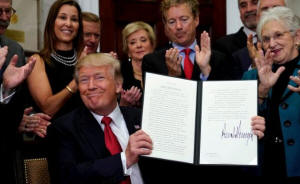|
Trump's Obamacare shift complicates
ability to work with Democrats
 Send a link to a friend
Send a link to a friend
 [October 21, 2017]
By Richard Cowan [October 21, 2017]
By Richard Cowan
WASHINGTON (Reuters) - President Donald
Trump's disavowal this week of a bipartisan agreement to stabilize
Obamacare has further eroded the already minimal trust congressional
Democrats had in him, complicating prospects for gaining their
cooperation on a range of issues.
Trump's fellow Republicans who control Congress will need at least some
Democratic support to pass critical legislation in the coming months to
avert a government shutdown and prevent an unprecedented U.S. debt
default.
"I've been here with every president since Jerry Ford," said Democratic
Senator Patrick Leahy, who was first elected to the U.S. Senate in 1974
and is its longest-serving member.
"I've always been willing to negotiate with anybody because they always
keep their word. If you have a president who doesn't keep his word, it
makes it more difficult," Leahy said when asked about Trump's
interactions with Congress.
Trump initially backed the bipartisan deal announced on Tuesday by
Democratic Senator Patty Murray and Republican Senator Lamar Alexander
for shoring up insurance marketplaces established under Obamacare for
two years by reviving federal subsidies to private insurers that Trump
has scrapped. A day later, Trump disowned it.

Going forward, Democratic Senator Jeanne Shaheen said that while more
collaboration with Trump is possible, "I think we have to know that we
can't count on him."
Trump enraged Republicans in September with his collaboration with top
Senate Democrat Chuck Schumer and top House of Representatives Democrat
Nancy Pelosi. Trump cut a short-term spending deal with them,
blindsiding Republican leaders, and then discussed with them the
outlines of a plan to revive protections for young adult immigrants
dubbed "Dreamers" brought into the United States illegally as children.
On both healthcare and Dreamers, Trump has shown that while he relishes
deal-making, he is quick to row back in the face of a conservative
backlash. The president also has sent signals over the past few weeks
that he is wavering on working with Democrats to help the Dreamers,
making demands that could be a deal-breaker.
Republicans have worked seven years to get rid of Obamacare, Democratic
former President Barack Obama's signature legislative achievement, and
many of them vehemently opposed the Alexander-Murray deal. It remains
unclear whether it will ever come to a vote in the Senate or House.
Because spending legislation requires a super-majority of 60 votes in
the 100-seat Senate and there are 52 Republican senators, it cannot pass
without at least eight Democrats backing it. Because hard-line House
conservatives often oppose spending bills, Democratic support is
expected to be needed there as well.

A Dec. 8 deadline is looming for passing the spending measure needed to
prevent a shutdown. Democrats could demand a steep price for their
support, potentially an Obamacare fix and action to help the Dreamers.
[to top of second column] |

President Donald Trump smiles after signing an Executive Order to
make it easier for Americans to buy bare-bone health insurance plans
and circumvent Obamacare rules at the White House in Washington,
U.S., October 12, 2017. REUTERS/Kevin Lamarque/File Photo

Under a budget resolution passed by the Senate on Thursday night,
Republicans need only a simple majority to pass Trump's proposed
major tax cuts, though he has urged Democrats to support the
overhaul.
'ZIGGING AND ZAGGING'
Schumer, who Trump earlier in the year called the Democrats' "head
clown" before their thaw last month, this week vented his
frustration about the president, saying he "keeps zigging and
zagging so it's impossible to govern."
"This president cannot govern if, whenever the hard right frightens
him and says 'jump,' he says 'how high?'" Schumer told reporters on
Wednesday.
Schumer and Pelosi dined at the White House with Trump last month,
and left feeling as if they had a deal on a proposal to help
continue protections for the Dreamers that the president has moved
to end effective in March.
Within a day, Trump began distancing himself from that deal, with
the White House later floating a series of hard-line immigration
"principles," including money for a wall along the U.S.-Mexico
border fiercely opposed by Democrats, that have thrown the entire
effort into doubt.
Pelosi and Schumer argue their deal with Trump is still salvageable,
as the president himself has not called it off.
Pelosi spokesman Drew Hammill acknowledged that the principles
"don't help" the effort. But Hammill said that would not stop
Pelosi, a former House speaker first elected to the chamber in 1987,
from engaging Trump in the future.
"It was always a case-by-case thing. It was never 'the switch was
on'" full-time, Hammill said.

There will be plenty of cases to come in the weeks ahead, giving
Trump an opportunity to improve his relations with Democrats if that
is what he wants, Hammill said.
As Congress and the White House approach the December deadline for
settling fiscal affairs, Hammill said Trump can use that opportunity
to stabilize Obamacare and shield Dreamers from deportation.
"If he's unable to do that, we're unable to work with him on his
priorities," including taxes, Hammill said.
(Reporting by Richard Cowan; Editing by Caren Bohan and Will Dunham)
[© 2017 Thomson Reuters. All rights
reserved.]
Copyright 2017 Reuters. All rights reserved. This material may not be published,
broadcast, rewritten or redistributed. |